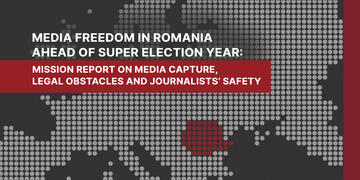
This report was prepared by Osservatorio Balcani e Caucaso Transeuropa (OBCT), International Press Institute (IPI), and Free Press Unlimited (FPU), with contributions from the other MFRR partners.
In 2024 several rounds of elections will take place in the country. Four themes emerged as corresponding to four set of obstacles posed to the daily work of journalists:
1. Media capture, and the ways in which it unfolds in Romania, through an opaque allocation of the “media and propaganda” fund that political parties assign to media outlets. The size of this funding, an overall yearly budget of about 20 million euros, and its lack of transparency, has generated a media culture that relies on clientelism and fails to hold accountable those in power. The controlling mechanism in place, the Permanent Electoral Authority, overseeing the expenditure of funds, fails to make relevant information available to the public.
The MFRR calls on policy makers to reform the system in order to ensure full transparency over the use of political funds, in line with EU’s regulation on political advertising and the EMFA. The MFRR also calls on media outlets to clearly label all content that was supported by political funds.
2. The burden posed to journalists by legal intimidations. While lacking quantitative data, the mission has found evidence of legal harassment being widespread, targeting especially investigative journalists. However, often, those in power do not need to formalize their lawsuits in order to hamper media reporting. A legal threat often suffices. Even when damage requests are not enormous, even when the compensation claims amount to a few thousand euros, they can threaten the survival of smaller newsrooms, such as the many indiepent and local media outlets that do not rely on public spending. SLAPPs pose a serious threat to democracy and the phenomenon of vexatious lawsuits, combined with a culture of illegal political spending, risks silencing an already limited poll of independent critical voices.
The MFRR calls on Romanian journalists, lawyers and civil society to work together advocate for an effective transposition of the EU anti-SLAPP directive, advocating for legal and extra legal provisions to counter SLAPPs that meet the highest standards as formulated in the 2022 EU anti-SLAPP recommendations as well and the anti-SLAPP recommendation of the Council of Europe, which are to be issued in the following weeks.
3. As far the issues related to the safety of journalists, the case of Emilia Sercan, while not common, testifies to the intolerance of public figures to investigative journalism and shows how vicious their reaction can be, bearing death threats and widespread smearing campaigns, generating question also about the willingness and independence of the judiciary in addressing the case. Online harassment and trolling was reported as widespread but generally accepted as almost an inevitable pitfall of the profession, a hostile mechanism which not only challenges the mental health of media professionals, it also risks pushing away young aspiring journalists.
The MFRR calls on the Romanian government to fulfill the EU as well as the Council of Europe Recommendations of the Safety of Journalists. The MFRR also calls on the government to reform police and judicial practices regarding the safety of journalists.
4. Local journalism faces the biggest challenges, each of the obstacles mentioned above being exacerbated.
The MFRR calls on local governments to abide by the EMFA rules on distribution and transparency, regardless of their population size.
Tags: Romania SLAPP Media freedom Media pluralism Safety of journalists Media captureThe content of this article can be used according to the terms of Creative Commons: Attribution-NonCommercial 4.0 International (CC BY-NC 4.0) . To do so use the the wording "this article was originally published on the Resource Centre on Media Freedom in Europe" including a direct active link to the original article page.

